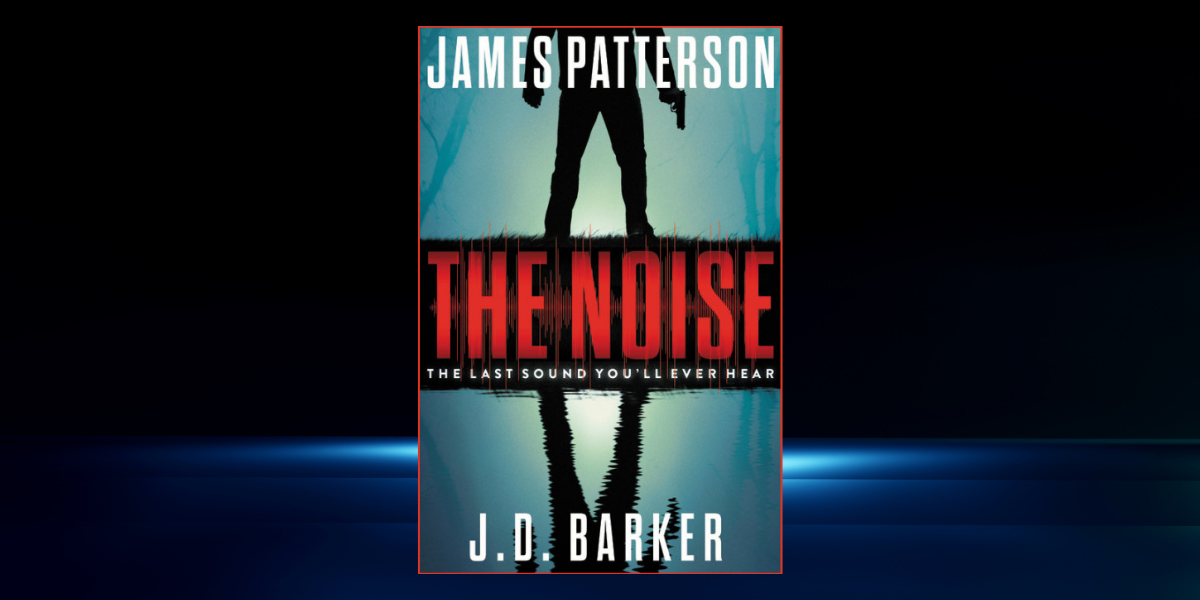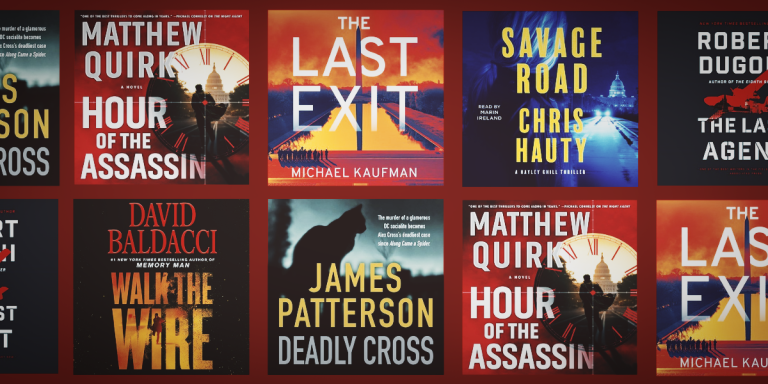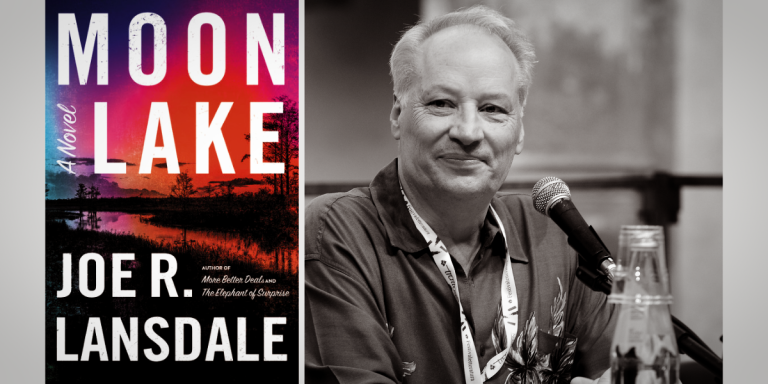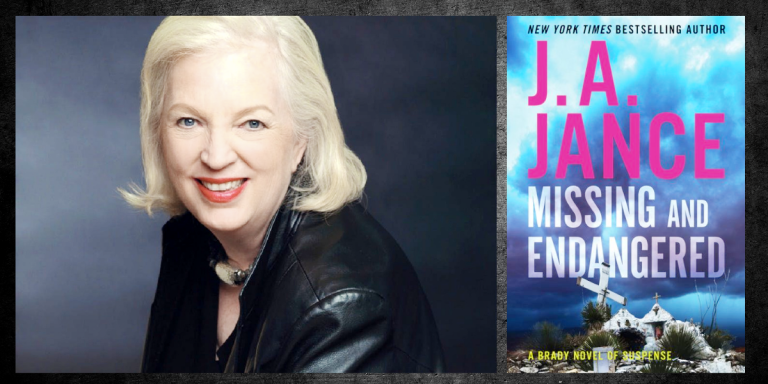Read the Excerpt: The Noise by James Patterson and J.D. Barker

CHAPTER SIX
MARTHA
THE HEADSET WAS FAR too large for Dr. Martha Chan. Even with the band adjusted to the smallest setting, they kept slipping down her forehead—she found herself holding them in place, alternating from her right hand to her left and back again whenever her arm got tired. They did the job, though. The heavy thwack of the helicopter rotors were reduced to a rhythmic thump with the metallic breathing of her pilot amplified over the speakers.
“I’m sorry about that,” he said again. “They’re the smallest I have.” He’d apologized twice now.
At only five foot one, Martha was no stranger to things not fitting, particularly when it came to military aircraft. After getting picked up at just after two in the morning from her apartment in San Francisco, she’d been shuttled to a C-1 transport plane at Yerba Buena Island, rushed from the Army sedan up the steps and into one of the jump seats on the port side of the aircraft. She’d felt like a child as one of the pilots helped secure her with a double- banded belt, tugging it tight over her shoulders. She’d noted his fatigues bore no name badge or insignia of any kind; same with the other pilot. Aside from the two of them, she was alone in the large aircraft as it lumbered down the tarmac and took flight.
Two hours later, they’d touched down. The moment the plane stopped moving, the pilot was back, unfastening the safety harness and ushering her down the steps to the awaiting EC135 chopper less than fifty feet away.
“Where are we?” Martha had asked, attempting to take in the air- field as they ran, ducking as they approached the spinning blades, her leather overnight bag slapping against her leg. She could see nothing beyond the lights of the airstrip and a group of hangars off in the distance. The night sky was black and gray, filled with dark, churning clouds. Even the moon had abandoned her.
“I’m not at liberty to say, ma’am.”
The too-large headphones had been sitting on the backseat of the helicopter. She’d put them on and adjusted the microphone as her escort closed and locked the door, then ran back toward the plane.
Her new pilot had looked back at her and nodded toward a large manila envelope on the seat beside her. “Ma’am? Please place your cell phone in that envelope. I was told to collect
all communication devices before I’m permitted to go airborne.” He glanced at her Apple Watch. “That, too, please.”
Martha frowned. “The watch isn’t cellular. I just use it to track my fitness information.” “Please, ma’am. I have orders.”
She sighed. She knew better than to argue with military personnel. He’d sit here for the next two weeks and wait on her before he’d violate orders. None of these guys seemed to think for themselves. She supposed that was appealing for some, but not for her. Mark, her ex-husband, would be the first to tell anyone willing to listen that Martha was a control freak of the highest degree. In the final months of their marriage, they’d had blowout arguments over things as ridiculous as who got to control the television remote.
Understandable, considering his choice in programming was shit, but the arguments didn’t stop there—they’d managed to find a way to fight about damn near everything. Fighting might have been the only thing they were good at. Two strong-willed type-A personalities under the same roof was bound to end bad, always did. The twins held them together that last year. Without those two, they would have called it quits a long time ago.
Christ, the twins.
This coming weekend was her turn to take them. Nobody had told her how long she’d be gone this time. They never did.
A two-hour flight in the transport plane from the airbase in San Francisco could put her anywhere in the western United States—Idaho, Utah, Arizona. Maybe Wyoming, Colorado, or New Mexico. Even Baja, although she hadn’t seen any sign of the ocean. She had no way of knowing what direction they’d flown. She didn’t like not knowing where she was. She liked communication blackouts even less.
Martha powered down her phone and smartwatch, dropped them into the envelope, and handed it up to the pilot. The chopper was airborne a few minutes later, soaring through the night.
From the window, she studied the distant skyline. “What city is that?”
The pilot glanced out the window, then at her in the mirror. “I’m not at liberty—” She waved a hand and cut him off. “—not at liberty to say, I understand.”
They flew in silence for thirty minutes. The pilot was the first to speak. “You’re not military,” he asked. “Are you some kind of doctor?”
“What makes you think I’m not military?”
“Your clothes, that leather bag. The way you’re gripping your armrest. My military passengers tend to sit back and enjoy the ride, happy for the downtime. You look like you’re ready to jump. Civilian.”
Martha released the armrest and nudged her headphones back up on her head. “Doctor, yeah.”
“Where’d you go to school?”
“I did my undergrad in biology at UC San Francisco, then four years at Hopkins studying trauma surgery. After that, I got my psychology PhD from Berkeley.” She was looking out the window again. “Are those mountains down there?”
He ignored her. “That’s a lot of school.” “I like school.”
“Kids?”
Martha nodded. “Boy and a girl, twins. Emily and Michael.” “How old?” “Eight.”
“Good for you.”
Light started to creep up over the horizon. They were heading east.
“I’ve got a little boy, name’s Tim, after his grandpa. He’s going on thirteen now.” The pilot showed her a photograph of a boy with a mop of white hair holding up a fish.
“Tighten up your belt. We’re about to land.”
Through the window, she spotted a familiar landmark. Mount Hood. She and Mark had gone camping up here once, back when things were good. So this was Oregon.
CHAPTER SEVEN
MARTHA
THE EC135 TOUCHED DOWN in the grass about thirty feet from two other helicopters, and a fiftyish man in a tan uniform with dark-olive pants ran out from the porch of the cabin, one hand holding his hat, the other shielding his eyes as the blades kicked up dust and dirt.
Martha took off her headphones and fumbled with the latch on her belt.
The man opened her door and shouted over the engine noise. “I’m Hoyt Rayburn with Forest Rangers. Welcome to Zigzag Station. Can I help you with that?” He snatched Martha’s bag from the seat before she had a chance to answer and helped her out of the chopper.
They were halfway to the cabin when the helicopter shot back up into the sky. Martha turned and frowned. “He still has my phone and watch.”
The blades of one of the other choppers started turning as a transport helicopter lowered a concrete barrier to the ground on thick cables, setting it down next to several others already in place. There were people crowded around, directing the work. The noise was deafening.
“What?” Rayburn shouted back. “Never mind.”
One hand still on his hat, he yelled, “Let’s get you inside. They’re waiting on you.” Another truck pulled up. Some type of military transport. A few men jumped out the back and began unloading rolls of chain-link fencing.
Martha followed Rayburn up the steps and into the building.
He closed the door behind her, took off his hat, and brushed the dust off. “They’ve got a crane on the way to finish up the barrier, but the powers that be didn’t want to wait so they brought that thing in from Kingsley. Probably scaring the wildlife half to death.”
“Why are they building a barrier?”
“Dr. Chan?”
A man in jeans, black boots, and a white button-down shirt stood in a doorway toward the back of the room. He was about Martha’s age, with thinning dark hair cropped close to his head. “In here, please.”
Martha didn’t move. “You are?”
He didn’t answer. Instead, he turned and walked back into the room.
“DIA,” Rayburn said softly. “At least I think so. He got here first. I heard him on the phone.” “Defense Intelligence Agency?”
“Now, Dr. Chan,” the man called out from the other room. Rayburn handed Martha her leather bag. “Best to keep that close.” Zigzag Station was larger than it appeared from the outside. The walls of the main room were lined with educational displays— photographs of local wildlife with detailed descriptions and histories stenciled beneath protective plastic. Martha imagined this was the kind of place schoolchildren visited on field trips. There was a counter off to the far right covered in pamphlets and brochures for local tours and outings. There were several vending machines, too, stocked with water and soda, candy and energy bars. Although the exterior of the cabin was covered in siding, the interior was made up of exposed beams and white oak, most likely sourced locally. There was a fireplace, but it didn’t look like anyone had used it in some time, more for show now.
As she stepped through the doorway at the back, three more people looked up at her from around a large oak table. Two men and a woman. One man wore a suit, the second was in a sweatshirt and jeans, the woman wore a tank top and yoga pants, her hair pulled back in a ponytail. Martha pictured a crew similar to the one that collected her picking this woman up from the middle of a morning jog somewhere. Without a word, they all looked back down at the large stack of papers in front of each of them.
The man from DIA pointed toward a vacant spot. Another pile of pages there, a black ballpoint on top. “Please take a seat, Dr. Chan.”
“I’d like to know what we’re doing here.”
“No speaking until you’ve read and signed the NDA. You’ll need to initial each page in the bottom right corner as well.”
Martha frowned. “NDA? I have Top Secret clearance.”
The man in the suit fought back a grin and flipped to the next page of his papers. Martha glared at him. She wasn’t in the mood for this. Not at this hour. “This funny?”
Without looking up, he said, “We all have Top Secret clearance, Doctor. We all argued with this upstanding civil servant, and we all found ourselves no better for it. Best to read the document and sign so we all can get on with it.”
He spoke with a slight accent. British, but faint. Like he came to the States as a child.
The woman in the yoga pants glanced up at Martha, offered her a soft nod, then went back to reading.
Martha placed her bag in the corner of the room, sighed, and dropped down into the vacant chair. “Can I at least get some coffee?”
CHAPTER EIGHT
MARTHA
THE TOPMOST PAGE OF the thick document simply read, OFFICE OF THE JOINT CHIEFS.
As Martha read, two others joined the group and were handed NDAs of their own. A man and a woman, both in their mid to late forties. Although dressed casually, Martha caught a glimpse of a lab coat stuffed into the man’s bag, which was simply a canvas shopping bag. From their soft grumblings, she got the feeling they had been picked from a lab somewhere, and not allowed time to pack.
Thirty-seven minutes passed before the last person slid their NDA across the table to the man from DIA. He placed each of them carefully in an oversize leather briefcase, snapped the locks, and set it behind him on the floor against the wall.
Martha leaned forward in her chair. “Now can you tell us what this is all about?”
He studied each of their faces in turn, then looked down at his watch. “Shortly. We’re waiting on one more.”
“Introductions, then?” the man with the British accent said. “I’m Sanford Harbin with NOAA.”
“A climatologist?” Martha asked. Harbin nodded.
“Interesting. I’m Martha Chan, a civilian liaison with the military for medical crises, and a PhD in psychology at Berkeley.”
“Dr. Chan. Pleasure. I read a paper you wrote about a decade ago on the negative psychological effects of overpopulation in first-, second-, and third-world populations,” Harbin said.
“I read that paper, too,” the man in the white sweatshirt and jeans said. “My name is Russel Fravel. Astrophysicist. I’m with Garner out in Boulder.” Fravel, an African American, his hair graying at his temples, studied her from behind round, silver-framed glasses. “You estimated the planet could sustain nine to ten billion people at maximum. A bold statement, considering many others post numbers nearly double that. Some accused you of attempting to start a panic, considering we’re close to hitting your number.”
Martha shifted uncomfortably in her chair.
“I’m Dr. Brenna Hauff, planetary biology,” one of the latecomers said. She pointed a thumb at the man to her right. “This is Dr. Brian Tomes, geology. We’re both with NASA in Houston.”
“NASA?”
This came from the young woman across the table in the tank top and yoga pants. She pursed her lips, mulled this over. “A climatologist, an astrophysicist, geologist,
biologist, and a shrink. All brought together by the Department of Defense? My money is on alien invasion.”
Martha tilted her head at her. “And you are?”
“Dr. Joy Reiber. Department of Agriculture. I was set to give a speech today in DC and couldn’t sleep, so I figured I’d get a little exercise.” She jerked a thumb back at the man from DIA. “Mr. Holt kidnapped me near Washington Mall.”
“I hardly—”
She glared at him. “You showed me some bogus badge and rushed me into a van with two of your cohorts. I damn near maced you.”
Harbin looked up at him. “Mr. Holt, is it?”
Holt cleared his throat. “Keenen Holt. State Department.”
“Are we being invaded by little green men, Mr. Holt?” Harbin’s accent made the statement sound even more absurd than it was, yet nobody laughed.
An alarm went off—Holt’s watch. He silenced the beeping, checked the time, and glanced over at the door with a frustrated sigh. “Best to just get started.”
From a shelf behind him, Holt retrieved a laptop, which he set on the table. The screen came to life when he opened it. He sorted through some emails, located one. “I’m going to play a statement for you. I need you to pay close attention.”
He clicked on an attachment, and an image of an older man, bald, wearing a gray suit and red tie, filled the screen. He had a mole on the corner of his right cheek and deep bags under his eyes.
“That’s Frederick Hoover,” Harbin said. “He’s looked better. I worked with him on a project for the US Navy about six years ago. I believe he’s with DARPA now. Or at least he was the last time I spoke to him.”
DARPA, the notoriously cutting-edge research arm of the DOD — this was getting odder and odder, Martha thought.
Holt pressed the Play button.
“I apologize for the short notice, the ways and means necessary to bring each of you to your current location,” Hoover’s video began. “As you may have already surmised, the nature of the anomaly requires the utmost secrecy, and your cooperation is greatly appreciated. I would be remiss if I failed to point out that the NDAs you’ve signed clearly state that a violation of the Secrets Protection Act of 2008 carries a minimum of five years in military prison and a maximum penalty of death under the Treason Act as defined in Article III, Section Three of the United States Constitution. Should you speak to any unauthorized personnel, those individuals will be subject to the same. At this point, all your communication devices should have been turned in to an appropriate handler. If you’ve retained any form of communication device, you are hereby ordered to relinquish it immediately. Failure to do so will result in immediate charges, imprisonment, and replacement on this team. I ask that your handler pause the video at this point in order to give you the opportunity to turn in any remaining forms of communication.”
Holt pressed pause. “Christ,” Harbin muttered.
Tomes, the NASA geologist, dug through his canvas bag, pulled out an old BlackBerry, and tossed it on the table, his face red.
Holt took the phone and slipped it into his pocket. “Anyone else?” No one moved.
He started the video again.
“I imagine you to be curious as to why you are here. Understandably so. And while I would like to offer an explanation, I’m hesitant to do so. I fear sharing our current theories and analysis of the anomaly may prejudice your own opinions and theories, and we’d prefer you approach this situation without such handicaps, at least for your initial exposure. We will reevaluate upon debrief. In a moment, you will be transported to the anomaly. We ask that you do not consult one another until after your individual debrief and return to base. We’d prefer to hear your individual thoughts before you compare notes.”
At that point, the video ended.
“The anomaly,” Reiber repeated portentously.
Martha didn’t like this one bit. “Why a taped message instead of a live conference? Seems like just a way of avoiding questions.” Brenna Hauff, the other NASA scientist, leaned over
the table and pointed at the screen where the email was still open. “Look at the cc list here—Joint Chiefs, White House, about a dozen addresses with NSA . . .”
Holt reached over and closed the laptop before she could read the rest. “Your point of contact will be me. If necessary, I’ll initiate a conference with members of the distant team.”
“Our handler,” Harbin said with an edge to his voice. “Correct.”
“Since when does the Defense Intelligence Agency run scientific ops?” Martha asked. “Oh, this is clearly a military concern, not scientific,” Fravel pointed out.
“I never said I was DIA.” Holt locked the laptop in the leather briefcase with the NDAs. “We’re wasting time. I need everyone in the choppers. You can leave your personal belongings in this room. We’ve got a two-hour window.”
Martha watched him leave and head out the front door of the ranger station. Nobody moved.
After about a minute, Tomes tapped his pen several times on the table. “I don’t know about the rest of you, but I’m curious.” He got up and followed Holt.
“Me, too.” Reiber stood as well, tugging her tank top down with her left hand. Martha noted some kind of tattoo on the small of her back but couldn’t make out what.
Martha got up. The rest did as well.
Outside, she eyed the concrete and chain-link barrier going up around the perimeter, nearly half done now. More trucks had arrived while they were inside.
Harbin was studying it, too. He leaned close to Martha, whispered in her ear, “If they’re taking us to this anomaly in helicopters, clearly a distance from where we stand, aren’t you the least bit curious as to what they’re trying to keep out of this little slice of heaven?”
CHAPTER NINE
TENNANT
DALTON’S CREVASSE BROKE THE forest in half. Stretching nearly half a mile north and south, and nearly twenty feet wide at the center, it was a ragged, angry crack in the earth nicknamed “the Devil’s Doorway.” Poppa had said it was formed by a long, dry, ancient river or maybe an earthquake. Momma told her God had gotten angry and tried to tear the mountain in half. Both had claimed it had no bottom, and anyone who slipped off the edge would fall forever. Tennant and Sophie had spent hours throwing rocks over the side, listening for them to hit bottom but they never did.
Two footbridges crossed the expanse, one about a quarter mile south, the other to the north.
Sophie didn’t stop; she didn’t even slow. The sight of that edge seemed to invigorate her.
While Tennant found herself gasping for breath, Sophie only seemed to gain energy and speed. Her tiny legs moved with ungodly energy and purpose.
As they approached the crevasse, Zeke’s barking grew insistent, panicked, filled with whines and cries. He tore through the tangle of branches, slipped on some leaves, regained his footing, and bounded after Sophie. He reached her about fifteen feet from the edge, getting under her feet, trying to trip her up.
This slowed her, if only a little. Tennant ignored the burning in her legs and chest, and forced herself forward. She cut through the last of the trees, closed the distance, pushed off a rock, and leaped at Sophie.
Her fingers brushed the back of her sister’s jacket, rolled over the fur at the bottom, and slipped off the top of her jeans. Tennant’s shoulder cracked against the rocky earth and a sharp, white pain cut through her vision. Her outstretched hand closed around Sophie’s ankle, and she yanked her leg out from under her. Sophie fell forward, dropped hard on the rocks, and went still.
“Sophie!” Tennant cried out, scrambling to her hands and knees, less than a foot away from the edge. Gravel and earth crumbled away, fell down into the black.
Sophie was awake but stunned. She stared up at Tennant with those terrible bloodshot eyes.
Zeke shuffled back several steps watching them, a low growl in his throat.
There was blood on her sister’s face, the sides of her head, on her neck. Not from the fall, but from her mouth, ears, and nose. Tennant ran her hands over the back of Sophie’s head, through her hair, and didn’t find other injuries. But she felt hot to the touch, feverish.
“Hey, can you hear me?”
There was another growl. Tennant realized it hadn’t come from Zeke, but from Sophie. Her eyes narrowed and her tiny hands reached up, scratched at Tennant’s face, punched her chest. She managed to get a hold of Tennant’s braid and yanked her head sideways with incredible strength.
How was she so strong? Adrenaline?
Tennant grabbed her wrists, pinned them to her sides. The girl struggled like a wild thing caught in one of her traps.
“Stop, Sophie, stop!” Tennant wrapped her arms around her in a tight hug and pulled her close, like Poppa.
Sophie went limp, buried her face in Tennant’s shoulder, and began to sob.
Yet when Tennant loosened her grip, Sophie tried to slip away toward the crevasse again. She brought her knee up and caught Tennant in the gut, knocking the wind out of her. She tried to dive for the edge.
Only by sitting on Sophie’s chest, using her weight, did Tennant manage to hold her down. “Let me go!”
The voice came from Sophie but wasn’t hers — too deep, guttural, this inhuman thing. Zeke dropped down to his belly and whimpered, shuffled back.
Sophie snarled, twisted, her feet and hands lashing out. “Get off me!” Pink tears tinged with blood dripped down her face.
Her nails slashed the air, just missed Tennant’s eye. Tennant slapped her.
It had worked once before, but this time it seemed to anger her.
Her sister screamed out a torrent of awful, filthy words, some Tennant had never even heard. Then she realized she wasn’t speaking English but some foreign tongue. Momma had taught them some Spanish, but this was something else.
Sophie’s head thrashed side to side as she yelled, screamed, shouted these terrible things in a fit of rage.
This was all too much. Tears welled up in Tennant’s eyes, too. She found herself crying with her sister, trying to hug Sophie even if she didn’t want to, as she tried to fight her off.
Glancing back in the direction of their village, Tennant hoped someone would come out of the woods—Momma, Poppa. Someone, anyone. But nobody did.
She’d never felt so alone.
Order The Book
If you hear it, it’s too late. Can two sisters save us all?
In the shadow of Mount Hood, sixteen-year-old Tennant is checking rabbit traps with her eight-year-old sister Sophie when the girls are suddenly overcome by a strange vibration rising out of the forest, building in intensity until it sounds like a deafening crescendo of screams. From out of nowhere, their father sweeps them up and drops them through a trapdoor into a storm cellar. But the sound only gets worse . . .
By clicking 'Sign Up,' I acknowledge that I have read and agree to Hachette Book Group’s Privacy Policy and Terms of Use
What to Read Next







